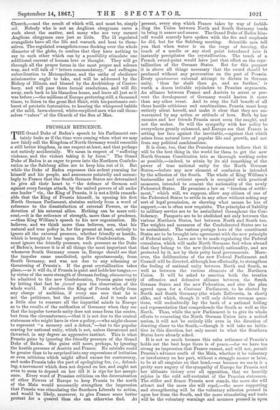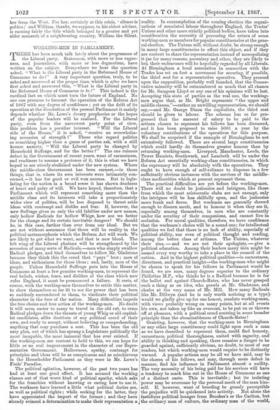PRUSSIAN RETICENCE.
THE Grand Dake of Baden's speech to his Parliament cer- tainly looks as if the time were coming when what we may now fairly call the Kingdom of North G,ermany would resemble a still better kingdom, in one respect at least, and that perhaps not entirely accidentally. We mean in respect of " suffering violence, and the violent taking it by force." The Grand Duke of. Baden is as eager to press into the Northern Confede- ration as the Salzburg allies are to keep him out of it. But while the Duke of Baden expresses this ardent yearning for himself and his people, and announces pointedly and menac- ingly to France that the South German States are determined to give all their heart to " the defence of German soil against every foreign attack, by the united powers of all under one leader" viz., the King of Prussia, it is not a little remark- able that the King of Prussia himself, in opening his first North German Parliament, abstains entirely from a word of reference to the dissatisfaction of external Powers, or the devotion of his external allies. Nothing can be more red- cent,—it is the reticence of strength, more than of prudence, —than King William's speech to his new organization. He believes, and we think more than believes, sees, that his natural and true policy is, for the present at least, entirely to ignore all the external pressure, whether friendly or hostile, which is brought to bear upon the New Confederation. He must ignore the friendly pressure, such pressure as the Duke of Baden's, because it is of all things the most important that whenever South Germany comes in, Europe should see that the impulse came unsolicited, quite spontaneously, from south Germany, and was not due to any scheming or threatening of Prussia's. If the great crystallization takes place,—as it will do, if Prussia is quiet and holds her tongue,— by virtue of the mere strength of German feeling, clamouring to be admitted to the new Confederation, Prussia gains vastly by letting that fact be forced upon the observation of the whole world. It absolves the King of Prussia wholly from any charge of ambition, if every one sees that he is -not the petitioner, but the petitioned. And it tends not a little also to reassure all the impartial minds in Europe as to the results of the unification of Germany when they see that the impulse towards unity does not come from the centre, but from the circumference,—that it is not due to the central statesman who might have in view a policy,—who might choose to represent "a memory and a defeat,"—but to the popular craving for national unity, which is not, unless threatened and thwarted, in any degree an aggressive instinct. This is what Prussia gains by ignoring the friendly pressure of the Grand Duke of Baden. She gains still more, perhaps, by ignoring the hostile pressure of Austria and France. No mistake could be greater than to be surprised into any expressions of irritation or even criticism which might afford excuse for controversy, and make Prussia take the part of apologizing for, i.e., defend- ing, a movement which does not depend on her, and ought not even to seem to depend on her till it is ripe for her accept- ance. Every word of Prussian criticism on the determination of other Powers of Europe to keep Prussia to the north Of the Main would necessarily strengthen the impression that Prussia was stimulating the Southern Liberals to action, and would be likely, moreover, to give France some better pretext for a quarrel than she can otherwise find. At present, every step which France takes by way of forbid- ding the Union between North and South Germany tends to bring it nearer and nearer. The Grand Duke of Baden him- self would scarcely have spoken with the fire and emphasis he did, but for the Salzburg meeting. Scientific men tell you that when water is on the verge of freezing, the touch of a needle or any steel point introduced into it instantly precipitates the crystallization. The touch of a French sword-point would have just that effect on the crys- tallization of the German States. But for this purpose it is above all things necessary that the sword should be produced without any provocation on the part of Prussia. Every spontaneous external attempt to dictate to German unity, thus far shalt thou go, and no further,' is worth a dozen irritable rejoinders to Prussian arguments. An alliance between France and Austria to arrest or pre- vent the development of Germany would hasten it more than any other event. And to reap the full benefit of all these hostile criticisms and combinations, Prussia must keep entirely silent herself, and make it clear that they are un- warranted by any action or attitude of hers. Both - by her enemies and her friends Prussia must seem the sought, and not the seeker. So will the sympathy with her policy be everywhere greatly enhanced, and Europe see that France is setting her face against the inevitable,—against that which arises from natural laws of popular life and growth, and not from any political machinations.
It is clear, too, that the Prussian statesmen believe that it will be the best thing in the world for them to get the new North German Constitution into as thorough working order as possible,—indeed, to attain by its aid something of the power of true national unity for the North German States,—before any new element of confusion is intruded by the adhesion of the South. The whole of King William's businesslike and reticent speech is occupied with practical measures, intended to cement the nationality of the newly Federated States. He promises a law on " freedom of settle- ment," which will, we suppose, allow any citizen of one of the Federated States to settle in any other without asking any sort of legal permission, or showing what means he has of support,—as is often now requisite. The principles of liability to military service are to be assimilated throughout the Con- federacy. Passports are to be abolished not only between the various Northern States, but between North and South too. The weights and measures of the Confederated States are to be assimilated. The various postage laws of the constituent States are to be brought into agreement with the new principle of Federal unity. Laws are to be made regulating the Federal consulates, which will make North Germans feel when abroad that they belong to the new (federated) nationality, and are protected by it, not by their petty local governments. More- over, the deliberations of the new Federal Parliament and Council will be directed, although less effectually, to strengthen the feeling of national unity between North and South, as well as between the various elements of the Northern Union. It will be asked to sanction both the treaties of offensive and defensive alliance between 'the South German States and the new Federation, and also the plan agreed upon for a Customs' Parliament, to be elected by North and South Germany (the whole Zollverein, in short) alike, and which, though it will only debate revenue ques- tions, will undoubtedly lay the basis of a national feeling and representation that comprehends the South as well as the North. Thus, while the new Parliament is to give its whole efforts to cementing the North German Union into a united nation, it will not be entirely idle even in the direction of drawing closer to the South,—though it will take no initia- tive in this direction, but only assent to what the Southern States have already asked.
It is not so much because this calm reticence of Prussia's holds out the best hope there is of peace,—for we have too strong an impression that France cannot, and will not, permit Prussia's advance south of the Main, whether it be voluntary or involuntary on her part, without a struggle sooner or later, to be at all sanguine on that head,—as because we see in it a pretty sure augury of the sympathy of Europe for Prussia and her ultimate victory over all opposition, that we heartily rejoice in the cold self-restraint of the Prussian statesmen. The stiller and firmer Prussia now stands, the more she will attract and the more she will repel,—the more supporting and strengthening will be the voluntary adhesion pressed in upon her from the South, and the more stimulating and tonic will be the voluntary warnings and menaces pressed in upon. her from the West. For her, certainly at this crisis, 'silence is golden;' and William, thanks, we suppose, to his ablest adviser, is earning fairly the title which belonged to a greater and yet abler monarch of a neighbouring country, William the Silent.































 Previous page
Previous page